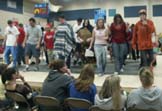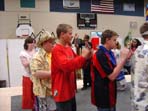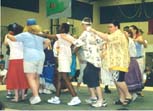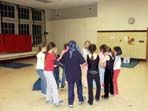|
Incorporating ethnic dance activities with in-school programs combines learning with elements of fun, experiential education and, healthy exercise to the curriculum and offers a different way to learn about the usual academic subjects. Furthermore, ethnic dance programs supplement learning across multiple disciplines including: history, geography, social studies, art, music and physical education.
Ethnic dance programs can be incorporated easily as units within a curriculum for social studies, physical education, etc. can be integrated with a higher goal of having students perform what they have learned as part of a Diversity Day, Multi-Cultural Fair, International Festival or School Assembly
Students can also provide service outside of the school by performing what they have learned at local or regional Community Festivals or at Retirement Communities.
After-School Programs
Quality after-school programs will provide important benefits including increased learning, improved health, increased exposure to career choices, and enhanced social and psychological development. In 2001, the Northwest Regional Educational Laboratory (http://www.nwrel.org) summarized the benefits from a 1998 review of research by the U.S. Department of Education and U.S. Department of Justice:
Learning Outcomes: After-school programs play a key role in improving student achievement through focused academic activities or indirect activities that provide challenges and motivation. Students' chances of improving in-school performance increase when they engage in structured after-school programs, including:
- Increased achievement in academic subjects
- Enhanced reading ability and confidence in reading
- Improved attendance rates and reduced drop-out rates
- Completion of more and better-quality homework
- Reduction in grade retention and special education placement
Health Outcomes: After-school programs foster healthier habits for students who would otherwise go home alone, including:
- Lower risk of teen parenthood (students not involved in extracurricular activities are 36 percent more likely to become teen parents)
- Decreased likelihood of substance abuse
- Enhanced nutrition and wellness
- Increased opportunity to engage in fitness activities
Career Outcomes: After-school programs provide a venue for student career exploration, including:
- Increased commitment to remain in school including higher aspirations to complete high school and college
- Exposure to a variety of careers and related interests through targeted activities such as job shadows, speakers, workplace visits, etc.
Developmental Outcomes: After-school programs provide venues for students to volunteer in their communities, learn leadership skills, and connect with adult mentors as well as opportunities to continue their social and psychological development, including:
- Reduced time watching television, especially more adult-oriented programs
- Reduced behavioral problems in school
- Enhanced ability to recognize and resolve conflicts
- Improved social and collaborative skills with peers and adults
- Improved self-confidence through meaningful relationships with peers and adults
- Increased personal sense of community
- Reduced participation in gangs
- Program Formats
- Single-event for in or after school program
- Series of 4 or more single-events for an in-school or after-school program
- Series of 4 or more multiple-events for in or after school program
- 6-8 week series of events for an in-school or after-school program
- Extra-curricular evening or weekend activity for adults, students, families or a school fundraiser
- One-day residency program, multiple-events for in or after school program
- One-week residency program in conjunction with a school assembly, multi-cultural fair, diversity day or international festival
- One-quarter residency program in conjunction with developing a sustained in-school or after-school program
- Six-month residency program in conjunction with developing a sustained in-school or after-school program
|



